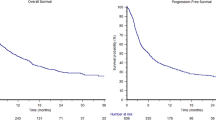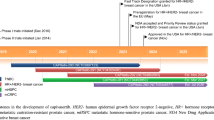Summary
Introduction Nimotuzumab is a humanized monoclonal antibody that binds to the EGFR. Based on phase I data, the recommended dose has been established at 200 mg weekly. This study was aimed at evaluating the safety and efficacy of nimotuzumab monotherapy in patients (pts) with locally advanced or metastatic pancreatic cancer. Methods Pts who failed first line standard chemotherapy for advanced disease and had at least one measurable lesion were eligible for the study. Nimotuzumab was given intravenously at 200 mg once weekly for 6 weeks (wks). Follow up by CT scan was performed after 8 weeks. Pts continued receiving treatment 3-weekly until disease progression or unacceptable toxicity occurred. Endpoints included tumor response (RECIST), progression-free survival (PFS), and safety. Results A total of 56 pts were enrolled for treatment (ECOG status of 1 [n = 41] or 0 [n = 15]), the majority (47 pts) had metastatic disease. Nearly half of the pts [n = 26] received ≥2 regimens. Pts evaluable for response: n = 36; CR: 0; PR: 0; SD: 6 pts. Median PFS for pts with SD was 19.2 weeks, for all pts 6.7 weeks (95% CI: 6.43–7.14 weeks). PFS after 1 year was 10.3% with a median overall survival of 18.1 weeks. Treatment-related adverse events were generally mild including rash grade 1 in 5 pts. After a single dose of 200 mg, the t1/2 was calculated to 45 h. Conclusion These data confirm that nimotuzumab is safe and very well tolerated. To improve efficacy, a randomized, placebo-controlled trial with Gem has been initiated.

Similar content being viewed by others
References
Jemal A, Siegel R, Ward E, Hao Y, Xu J, Thun MJ (2009) Cancer statistics, 2009. CA Cancer J Clin 59:225–249
Li D, Xie K, Wolff R, Abbruzzese JL (2004) Pancreatic cancer. Lancet 363:1049–1057
Burris HA III, Moore MJ, Andersen J, Green MR, Rothenberg ML, Modiano MR, Cripps MC, Portenoy RK, Storniolo AM, Tarassoff P, Nelson R, Dorr FA, Stephens CD, Von Hoff DD (1997) Improvements in survival and clinical benefit with gemcitabine as first-line therapy for patients with advanced pancreas cancer: a randomized trial. J Clin Oncol 15:2403–2413
Moore MJ, Goldstein D, Hamm J, Figer A, Hecht JR, Gallinger S, Au HJ, Murawa P, Walde D, Wolff RA, Campos D, Lim R, Ding K, Clark G, Voskoglou-Nomikos T, Ptasynski M, Parulekar W (2007) Erlotinib plus gemcitabine compared with gemcitabine alone in patients with advanced pancreatic cancer: a phase III trial of the National Cancer Institute of Canada Clinical Trials Group. J Clin Oncol 25:1960–1966
Mendelsohn J, Baselga J (2006) Epidermal growth factor receptor targeting in cancer. Semin Oncol 33:369–385
Lee J, Jang KT, Ki CS, Lim T, Park YS, Lim HY, Choi DW, Kang WK, Park K, Park JO (2007) Impact of epidermal growth factor receptor (EGFR) kinase mutations, EGFR gene amplifications, and KRAS mutations on survival of pancreatic adenocarcinoma. Cancer 109:1561–1569
Zhang H, Berezov A, Wang Q, Zhang G, Drebin J, Murali R, Greene MI (2007) ErbB receptors: from oncogenes to targeted cancer therapies. J Clin Invest 117:2051–2058
Friedlander E, Barok M, Szollosi J, Vereb G (2008) ErbB-directed immunotherapy: antibodies in current practice and promising new agents. Immunol Lett 116:126–140
Talavera A, Friemann R, Gomez-Puerta S, Martinez-Fleites C, Garrido G, Rabasa A, Lopez-Requena A, Pupo A, Johansen RF, Sanchez O, Krengel U, Moreno E (2009) Nimotuzumab, an antitumor antibody that targets the epidermal growth factor receptor, blocks ligand binding while permitting the active receptor conformation. Cancer Res 69:5851–5859
Crombet-Ramos T, Rak J, Perez R, Viloria-Petit A (2002) Antiproliferative, antiangiogenic and proapoptotic activity of h-R3: a humanized anti-EGFR antibody. Int J Cancer 101:567–575
Bier H, Hoffmann T, Haas I, van Lierop A (1998) Anti-(epidermal growth factor) receptor monoclonal antibodies for the induction of antibody-dependent cell-mediated cytotoxicity against squamous cell carcinoma lines of the head and neck. Cancer Immunol Immunother 46:167–173
Diaz MA, Blanco R, Garcia B, Badia T, Batista AE, Alonso R, Montero E (2007) Biological activity in vitro of anti-epidermal growth factor receptor monoclonal antibodies with different affinities. Hybridoma (Larchmt) 26:423–431
Viloria-Petit A, Crombet T, Jothy S, Hicklin D, Bohlen P, Schlaeppi JM, Rak J, Kerbel RS (2001) Acquired resistance to the antitumor effect of epidermal growth factor receptor-blocking antibodies in vivo: a role for altered tumor angiogenesis. Cancer Res 61:5090–5101
Allan DG (2005) Nimotuzumab: evidence of clinical benefit without rash. Oncologist 10:760–761
Crombet T, Osorio M, Cruz T, Roca C, del Castillo R, Mon R, Iznaga-Escobar N, Figueredo R, Koropatnick J, Renginfo E, Fernandez E, Alvarez D, Torres O, Ramos M, Leonard I, Perez R, Lage A (2004) Use of the humanized anti-epidermal growth factor receptor monoclonal antibody h-R3 in combination with radiotherapy in the treatment of locally advanced head and neck cancer patients. J Clin Oncol 22:1646–1654
Rojo F, Gracias E, Villena N, Cruz T, Corominas JM, Corradino I, Cedeno M, Campas C, Osorio M, Iznaga N, Bellosillo B, Rovira A, Marsoni S, Gascon P, Serrano S, Sessa C, Crombet T, Albanell J (2010) Pharmacodynamic trial of nimotuzumab in unresectable squamous cell carcinoma of the head and neck: a SENDO Foundation study. Clin Cancer Res 16:2474–2482
Ramos TC, Figueredo J, Catala M, Gonzalez S, Selva JC, Cruz TM, Toledo C, Silva S, Pestano Y, Ramos M, Leonard I, Torres O, Marinello P, Perez R, Lage A (2006) Treatment of high-grade glioma patients with the humanized anti-epidermal growth factor receptor (EGFR) antibody h-R3: report from a phase I/II trial. Cancer Biol Ther 5:375–379
Bode U, Buchen S, Warmuth-Metz M, Pietsch T, Bach F, Fleischhack G (2007) Final report of a phase II trial of nimotuzumab in the treatment of refractory and relapsed high-grade gliomas in children and adolescents. J Clin Oncol 2007 ASCO Annual Meeting Proceedings Part I. Vol 25:2006
Gounaris I, Zaki K, Corrie P (2010) Options for the treatment of gemcitabine-resistant advanced pancreatic cancer. JOP 11:113–123
Petrelli F, Borgonovo K, Ghilardi M, Cabiddu M, Barni S (2010) What else in gemcitabine-pretreated advanced pancreatic cancer? An update of second line therapies. Rev Recent Clin Trials 5:43–56
Pelzer U, Kubica K, Stieler J, Schwaner I, Heil G, Görner M, Mölle M, Hilbig A, Dörken B, Riess H, Oettle H (2008) A randomized trial in patients with gemcitabine refractory pancreatic cancer. Final results of the CONKO 003 study. J Clin Oncol 26 (May 20 suppl):abstr 4508.
Mateo C, Moreno E, Amour K, Lombardero J, Harris W, Perez R (1997) Humanization of a mouse monoclonal antibody that blocks the epidermal growth factor receptor: recovery of antagonistic activity. Immunotechnology 3:71–81
Boland WK, Bebb G (2009) Nimotuzumab: a novel anti-EGFR monoclonal antibody that retains anti-EGFR activity while minimizing skin toxicity. Expert Opin Biol Ther 9:1199–1206
Akashi Y, Okamoto I, Iwasa T, Yoshida T, Suzuki M, Hatashita E, Yamada Y, Satoh T, Fukuoka M, Ono K, Nakagawa K (2008) Enhancement of the antitumor activity of ionising radiation by nimotuzumab, a humanised monoclonal antibody to the epidermal growth factor receptor, in non-small cell lung cancer cell lines of differing epidermal growth factor receptor status. Br J Cancer 98:749–755
Rivera F, Vega-Villegas ME, Lopez-Brea MF, Marquez R (2008) Current situation of Panitumumab, Matuzumab, Nimotuzumab and Zalutumumab. Acta Oncol 47:9–19
Astsaturov I, Cohen RB, Harari P (2007) EGFR-targeting monoclonal antibodies in head and neck cancer. Curr Cancer Drug Targets 7:650–665
Loeffler-Ragg J, Schwentner I, Sprinzl GM, Zwierzina H (2008) EGFR inhibition as a therapy for head and neck squamous cell carcinoma. Expert Opin Investig Drugs 17:1517–1531
Tikhomirov IA, Garrido G, Yang E, Sherman I, Pérez R (2008) Bivalent binding properties of epidermal growth factor receptor (EGFR) targeted monoclonal antibodies: factors contributing to differences in observed clinical profiles. AACR Cancer Clinical Trials and Personalized Medicine (abstract A36).: Available from: http://www.ymbiosciences.com/upload_files/poster_nimo_AACR_Translational_Med_2008.pdf
Garrido G, Rabasa A, Gracia E, Tikhomirov I, Crombet-Ramos T, Viloria-Petit A, Kerbel RS, Yang E, Perez R (2009) Binding properties of the anti-EGFR monoclonal antibody, nimotuzumab, limit its interaction with the EGFR in renal and epidermal cells. AACR 100th Annual Meeting (abstract 2763): Available from: http://www.ymbiosciences.com/upload_files/nimo_poster_AACR2009.pdf
Lynch TJ, Bell DW, Sordella R, Gurubhagavatula S, Okimoto RA, Brannigan BW, Harris PL, Haserlat SM, Supko JG, Haluska FG, Louis DN, Christiani DC, Settleman J, Haber DA (2004) Activating mutations in the epidermal growth factor receptor underlying responsiveness of non-small-cell lung cancer to gefitinib. N Engl J Med 350:2129–2139
Author information
Authors and Affiliations
Corresponding author
Rights and permissions
About this article
Cite this article
Strumberg, D., Schultheis, B., Scheulen, M.E. et al. Phase II study of nimotuzumab, a humanized monoclonal anti-epidermal growth factor receptor (EGFR) antibody, in patients with locally advanced or metastatic pancreatic cancer. Invest New Drugs 30, 1138–1143 (2012). https://doi.org/10.1007/s10637-010-9619-8
Received:
Accepted:
Published:
Issue Date:
DOI: https://doi.org/10.1007/s10637-010-9619-8




